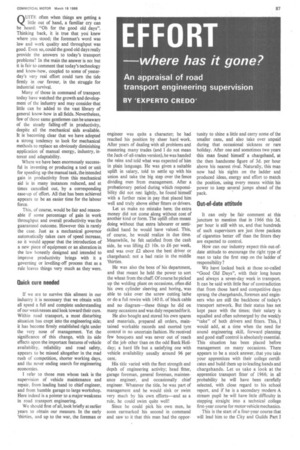EFFORT
Page 89

If you've noticed an error in this article please click here to report it so we can fix it.
QUITE often when things are getting a little out of hand, a familiar cry can be heard: "Oh for the good old days". Thinking back, it is true that you knew where you stood; the foreman's word was law and work quality and throughput was good. Even so, could the good old days really provide the answers to today's transport problems? In the main the answer is no: but it is fair to comment that today's technology and know-how, coupled to some of yesterday's very real effort could turn the tide firmly in our favour, in the struggle for industrial survival.
Many of those in command of transport today have watched the growth and development of the industry and may consider that little can be added to the vast library of general know-how in all fields. Nevertheless, few of those same gentlemen can be unaware of the steady falling-off in productivity, despite all the mechanical aids available. It is becoming clear that we have adopted a strong tendency to look for mechanical methods to replace an obviously diminishing application of manual energy, industry, interest and adaptability.
Where we have been enormously successful in inventing or producing a tool or unit for speeding up the manual task, the intended gain in productivity from this mechanical aid is in many instances reduced, and at times cancelled out, by a corresponding ease-up of effort. All that has been achieved appears to be an easier time for the labour force.
This, of course, would be fair and reasonable if some percentage of gain in work throughput and overall productivity was the guaranteed outcome. However this is rarely the case. Just as a mechanical governor automatically takes care of speed increase, so it would appear that the introduction of a new piece of equipment or an alteration in the law honestly designed and intended to improve productivity brings with it a governing or levelling-off process that as a rule leaves things very much as they were.
If we are to survive this ailment in our industry it is necessary that we obtain with all speed a full and complete understanding of our weaknesses and 'look toward their cure. Within road transport, a most disturbing situation has crept into the engineering side; it has become firmly established right under the very nose of management. Yet the significance of this change, with its side effects upon the important features of vehicle availability, reliability and road safety, appears to be missed altogether in the mad rush of competition, shorter working days, and the never ending search for engineering economies.
I refer to those men whose task is the supervision of vehicle maintenance and repair, from leading hand to chief engineer, and from humble garage to large workshop. Here indeed is a pointer to a major weakness in road transport engineering.
We should first of all, look briefly at earlier years to obtain our measure. In the early 'thirties, and up to the war, the foreman or engineer was quite a character; he had reached his position by sheer hard work. After years of dealing with all problems and mastering many trades (and I do not mean the Jack-of-all-trades version), he was handed the reins and told what was expected of him in plain language. He was given a suitable uplift in salary, told to settle up with his union and take the big step over the fence dividing men from management. After a probationary period during which responsibility did not rest lightly, he found himself with a further raise in pay that placed him well and truly above either fitters or drivers.
Let us make no mistake here; the extra money did not come along without cost of another kind or form. The uplift often meant doing without that extra labourer or semiskilled hand he would have valued. This, of course, he would realize in due time. Meanwhile, he felt satisfied from the cash side, he was lifting £5 10s. to £6 per week, and was over £2 above the best driver or chargehand; not a bad ratio in the middle 'thirties.
He was also the boss of his department, and that meant he held the power to sort the wheat from the chaff. Of course he picked up the welding plant on occasions, often did his own cylinder sleeving and boring, was able to take over the screw cutting lathe or do a full rewire with 140 ft. of black cable and no diagram—these things he did on many occasions and was duly respected for it.
He also bought and stored his own spares and materials, prepared all orders, maintained workable records and exerted tyre control in no uncertain fashion. He received few bouquets and was never out of reach of the job other than on the odd Bank Holiday; a hard life but a satisfying one with vehicle availability usually around 96 per cent.
His title varied with the fleet strength and depth of engineering activity; head fitter, garage foreman, general foreman, maintenance engineei, and occasionally chief engineer. Whatever the title, he was part of management and he would sink or swim very much by his own efforts—and as a rule, he could swim quite well!
Since he could pick his own men, he soon earmarked his second in command and saw to it that this man had the oppor
tunity to shine a little and carry some of the smaller cans, and also take over unpaid during that occasional sickness or rare holiday. After one and sometimes two years this man found himself a chargehand, at the then handsome figure of 3d. per hour above his nearest rival. Naturally, this man now had his sights on the ladder and produced ideas, energy and effort to match the position, using every means within his power to keep several jumps ahead of the pack.




































































































































































